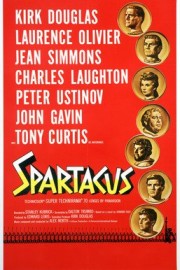Spartacus
It’s interested that the movie that gave Stanley Kubrick his creative freedom is also the one on which he had the least freedom of the last 40 years of his career. After Anthony Mann was fired by star/executive producer Kirk Douglas after a week of filming, Douglas enlisted his “Paths of Glory” director Kubrick, and the result was the biggest hit of either man’s career, at the time. For Douglas, it was the peak of a storied career, while for Kubrick, it was the beginning of a period of stunning creativity and artistic control, even though he would later disown it, due to his lack of control over the final product.
There’s another behind-the-scenes force that deserves mention when it comes to “Spartacus’s” creation, and that is the screenwriter who adapted Howard Fast’s novel about the Roman slave-turned-leader of a rebellion against the Empire. The script was originally worked on by Fast, but ended up being written by Dalton Trumbo. If that name doesn’t ring a bell now, that makes sense, but at the time, it was quite a coup. You see, Trumbo was one of the “Hollywood 10,” a group of artists who had been blacklisted by the entertainment industry in the ’50s due to questionable political ties. When Douglas hired Trumbo, and forced the industry to allow him to use his own name, rather than a pseudonym, it was a major accomplishment that did away with the blacklist for good. Is part of the reason Trumbo took on the project because he found himself akin to Spartacus, who would find himself martyred by Rome for daring to lead a rebellion against enslavement? Given he was martyred himself during the McCarthy-era witch hunts against communism, it’s hard not to see the parallels.
“Spartacus” was made during what could be considered a golden age for the great American epic films. The year before, “Ben Hur” won more Oscars than any other film had, and the years before and after “Ben Hur” saw a great many movies like it, such as “The Ten Commandments,” “Lawrence of Arabia,” “Cleopatra,” and “King of Kings.” Nowadays, movies of this scale and scope, with big, archetypal themes and massive casts and crews, are actually few and far between, with “Braveheart” and “Gladiator” being two of the only real stand-out examples of the genre in the past 25 years. “Spartacus” was, no doubt, influential on both of those films, and it’s undoubtedly because of having Kubrick as a director. Although the films he would make after “Spartacus” had him utilizing sets and controlled environments, the master filmmaker does a great job with the location shooting on this film, and stages each scene in a way that makes it look effortless, and as if it is being filmed by a documentary crew. Yes, the film has many theatrical touches in terms of the performances and staging in many of the more intimate scenes, but this is the work of a filmmaker more intrigued by moments between characters than large-scale mythmaking. The film does lean more towards the latter than the former, but that’s not terribly surprising given that Kubrick was really a director-for-hire on “Spartacus” rather than an iconoclast who developed the film from scratch, with a very personal reason for telling the story. That said, Kubrick gives it his all, and the end result, with Oscar-nominated editing and music (the latter of which was by Alex North, whose score is considered one of the very best in film history) to go along with the Oscar-winning costumes, cinematography and art direction, is a technical masterpiece to stand next to any of the director’s films.
I know a lot of people are suckers for these big epics, and I get it– there’s something romantic and thrilling about stories that center around heroes who have personal dramas that result in large-scale conflicts, usually surrounding the concept of freedom. There are some of these movies that I love myself, with “Braveheart” still being the biggest of them all, in my mind, although there are moments and things about “Gladiator” and “The Patriot” and “Master and Commander” I love. “Spartacus” certainly has things like that which work for me, starting with North’s beautiful, epic score and including Douglas’s heroic turn as Spartacus; Sir Laurence Olivier’s Crassus, who manipulates things behind-the-scenes to become a powerful leader against Spartacus’s rebellion; Tony Curtis’s Antoninus, a slave who is well versed in entertainment, but is inspired to fight by Spartacus’s example; as well as scenes such as an early one where two women who have traveled with Crassus choose slaves to fight one another, and the spark of rebellion that pays off that choice, a romance that begins between Spartacus and a slave girl (Jean Simmons), and of course, a battle scene that, no doubt, played remarkably more distinctive in a time before “Braveheart” and “Gladiator,” but still maintains a charge now. It’d be impossible for me to dismiss “Spartacus” as just an average epic, especially considering how it stands as a template of epics to come in it’s wake, but it doesn’t quite have the same impact on me as a fan as later ones have, even when rebels, after the bloody battle during the second half of the film, try and shield their leader from his certain death by proclaiming, proudly, “I am Spartacus!” That could change with multiple viewings, though, as it has with other Kubrick films. Now, though, finally seeing it for the first time, it just feels like many other epics I’ve seen over the years, without much to distinguish it from the crowd. Even on the first time through it, few other Kubrick films have had me thinking that before.










